|
|
|
Sort Order |
|
|
|
Items / Page
|
|
|
|
|
|
|
| Srl | Item |
| 1 |
ID:
148916
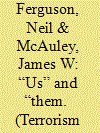

|
|
|
|
|
| Summary/Abstract |
This article draws on data from one-to-one interviews with members and former members of the Ulster Volunteer Force, Ulster Defence Association, Red Hand Commando, Ulster Political Research Group, and the Progressive Unionist Party to explore the dynamic and fluid perceptions of the Irish Republican Army (IRA) and Sinn Féin among Ulster loyalists. The article will explore how attitudes and perceptions are influenced by the shifting political landscape in Northern Ireland as Ulster loyalists come to terms with the new realities created by the peace process, security normalization, decommissioning, and the rise in the threat of dissident republican violence. The article will also demonstrate that these perceptions are not purely antagonistic and based on the creation of negative, stereotypical “enemy images” fuelled by decades of conflict, but pragmatic, bound to societal and local events, and influenced by intragroup attitudes and divisions, in addition to the expected conflictual ingroup vs. outgroup relationships. Finally, the article will explore how loyalists employ republicanism and the transformation of the Provisional IRA in particular, as a mirror or benchmark to reflect on their own progress since 1994.
|
|
|
|
|
|
|
|
|
|
|
|
|
|
|
|
| 2 |
ID:
148908
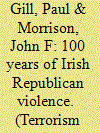

|
|
|
|
|
| Summary/Abstract |
In this supreme hour the Irish nation must, by its valour and discipline and by the readiness of its children to sacrifice themselves for the common good, prove itself worthy of the august destiny to which it is called.
|
|
|
|
|
|
|
|
|
|
|
|
|
|
|
|
| 3 |
ID:
148912


|
|
|
|
|
| Summary/Abstract |
Counterterrorism strategies involving the killing of terrorists are a prominently used but controversial practice. Proponents argue that such strategies are useful tools for reducing terrorist activity, while critics question their effectiveness. This article provides empirical insight into this strategy by conducting a series of negative binomial regression and Tobit estimations of the impact of killing Provisional Irish Republican Army (PIRA) terrorists as well as members of the Catholic community on counts of PIRA bombings and targeting activity in Northern Ireland for the period 1970–1998. We consider the impact of discriminate and indiscriminate killings (where only PIRA militants are killed versus those in which both militants and civilians are also killed) on subsequent PIRA improvised explosive device (IED) attacks. Our findings illustrate that while total and discriminate counterterrorism killings have little to no effect on PIRA IED attacks, indiscriminate counterterrorism killings increased PIRA bombings overall and prompted the Provisional IRA to specifically target civilians in IED events. We conclude by discussing the scholarly and policy implications of these findings.
|
|
|
|
|
|
|
|
|
|
|
|
|
|
|
|
| 4 |
ID:
148909
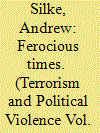

|
|
|
|
|
| Summary/Abstract |
The 1916 Rising was, in military terms, a shambolic failure. Despite the fact that Britain was locked in a gruelling struggle with Germany, the Rising was still utterly crushed within a week. How then, in the aftermath of victory against Germany, did Britain fail to win the subsequent struggle with the Irish Republican Army (IRA) between 1919 and 1921? This article assesses some of the key factors that played out in the conflict, drawing particular attention to the IRA's focus on the Royal Irish Constabulary and the consequences of this, and then later, how distorted perceptions of the proximity of success ultimately undermined British commitment. One of the most remarkable features of the conflict was the widespread belief among many on the British side (and more than a few in the Republican camp) that the IRA was on the verge of total defeat when the truce was declared in 1921. The IRA had suffered heavy casualties and were running low on weapons and ammunition. Yet, somehow the movement prevailed. This article aims to shed light on how and why that happened.
|
|
|
|
|
|
|
|
|
|
|
|
|
|
|
|
| 5 |
ID:
148918
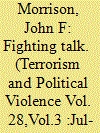

|
|
|
|
|
| Summary/Abstract |
With the advent of the new violent dissident merger, “The IRA/New IRA,” the group and its affiliates have had to legitimise their new existence. They have utilised the maintenance of paramilitary activity to achieve this. However, they have also produced a number of organisational statements, justifying their position, tactics, and strategies. This article analyses the evolution of these statements, both pre and post-merger from 2007 to 2015. 126 individual statements and four magazines are analysed using grounded theory. This analysis found that the statements have a dual strategy, aiming to foster trust in the movement and distrust in their perceived enemies. One of the dominant ways in which the group aims to foster trust is by proposing their possession of an historical mandate from the republican forefathers of 1916, as well as the internally lauded paramilitaries from The Troubles-era Provisional Irish Republican Army. The focus of the distrust narrative has been on the “constitutional nationalism” of Sinn Féin. However, it also pours scorn on the Police Service of Northern Ireland, and capitalism, across the island of Ireland. The analysis of these statements can provide us with an understanding of the future direction of the group, as well as giving us insight, which can inform the development of any counter-narrative.
|
|
|
|
|
|
|
|
|
|
|
|
|
|
|
|
| 6 |
ID:
148920
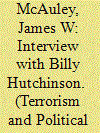

|
|
|
| 7 |
ID:
148919


|
|
|
| 8 |
ID:
148910
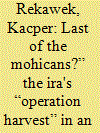

|
|
|
|
|
| Summary/Abstract |
In 1956, the Irish Republican Army (IRA) launched “Operation Harvest,” an overtly ambitious guerrilla effort that was meant to secure the political unity of Ireland by force of arms. It was waged against the backdrop of a “thaw” in international relations and drew inspiration from successful anti-colonial guerrilla struggles in Algeria and Cyprus. The IRA was unaware of the simultaneous, parallel, unsuccessful irredentist efforts in Central and Eastern Europe in which anti-communist guerrillas clashed with totalitarian security apparatuses of the USSR or its satellite states. Studying the latter campaigns, which had begun earlier and were conducted by far larger and more effective guerrilla forces, might have convinced the organisation that such insurgencies in post-1945 Europe had very little hope of success. This article for the first time thematically contrasts the irredentist efforts of the IRA and the parallel Central and Eastern European guerrillas. It aims to bring to light cases that are hardly ever discussed in the Irish context but which could be of surprising use if one wishes to comparatively assess Ireland or the IRA.
|
|
|
|
|
|
|
|
|
|
|
|
|
|
|
|
| 9 |
ID:
148915
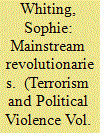

|
|
|
|
|
| Summary/Abstract |
Despite the seismic shift of Sinn Féin from being the “mouthpiece” of the Provisional Irish Republican Army to the largest nationalist force in Northern Ireland, the party continues to project its objectives within the revolutionary politics and tradition of 1916. Whilst various groups across the island of Ireland stress their loyalty to Irish independence and allegiance to their republican forefathers, 2016 also plays host to devolved assembly elections in Northern Ireland. The centenary of the Easter Rising is therefore a poignant moment to reassess republican politics, more specifically, the relationship between the armed revolutionary tradition and constitutionalism. Within the post-peace process era Sinn Féin have been accused of maintaining an autocratic culture and an intra-party framework that is more representative of a clandestine revolutionary organisation than a political party. Yet, simultaneously, Sinn Féin have not been immune to the pressures experienced by other modern political parties, bound by the laws of electoral competition and driven by office-seeking priorities. In order to explore Sinn Féin within the modern political arena, this article firstly examines the broader debate surrounding how armed groups make the transition into constitutional politics. Secondly, public opinion survey data is used to judge the basis of Sinn Féin's electoral appeal. Finally, internal party documents are used to examine party structure, intra-party democracy, and professionalisation in order to judge the extent to which Sinn Féin have completed the transition from being a “mouthpiece” to their armed counterpart, towards being a “normal” political party.
|
|
|
|
|
|
|
|
|
|
|
|
|
|
|
|
| 10 |
ID:
148917
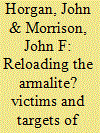

|
|
|
|
|
| Summary/Abstract |
The centenary of the 1916 Rising marks a time of peaceful commemoration, across the island of Ireland. However, several violent dissident republican groups wish to seize it as an opportunity to re-organise in an attempt to bolster and legitimise their sustained paramilitary campaign. This study seeks to provide a greater understanding of how this paramilitary activity has manifested from 2007 to mid-2015. We do this by assessing target selection, through analysis of the Violent Dissident Republican (VDR) events database. The data suggest that civilian targets are the most regularly attacked. However, when exclusively analysing targets of detonated explosives, the data show that police, security personnel, and their infrastructure are more consistently targeted. The target selected can and does have an effect on attack method. These findings can both assist in protecting the potential targets of VDR attacks and contribute to the development of a strong nationalised, and localised, counter VDR narrative.
|
|
|
|
|
|
|
|
|
|
|
|
|
|
|
|
| 11 |
ID:
148913


|
|
|
|
|
| Summary/Abstract |
The British experience in Northern Ireland, particularly the fight against the Provisional Irish Republican Army (PIRA), is an oft-cited case study in the counter-insurgency (COIN) spectrum and tome of counter-terrorism studies. It is the totality of the British intelligence experience in Northern Ireland, with its successes and challenges, which make it such a valuable case study from which to draw insight to shape contemporary COIN intelligence-based operations. As the conflict was both prolonged and intensified, a multitude of intelligence units from military and law enforcement evolved specifically to counter the effectiveness of PIRA; and to satisfy the desire of the security establishment to intensify information-gathering activities. This article examines the evolution and development of this security intelligence-driven effort that ultimately had the cumulative effect to wear down PIRA’s military capability through the focused application of a prolonged and lavishly resourced linked intelligence apparatus as an adjunct of a heavy military and police footprint. Nevertheless, despite Northern Ireland being a relatively small geographical area, the eventual containment of PIRA took years to achieve, demonstrating just how difficult it is to address a committed and determined insurgency. This highlights that a successful COIN strategy is arguably best predicated on the need for “patient” as opposed to “decisive” operations.
|
|
|
|
|
|
|
|
|
|
|
|
|
|
|
|
| 12 |
ID:
148914
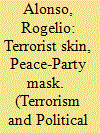

|
|
|
|
|
| Summary/Abstract |
The article analyses the political communication strategy adopted by Sinn Féin in order to legitimize the Provisional Irish Republican Army's (PIRA) terrorist campaign during their transition from violence into mainstream politics. Their endeavours to portray a triumphant republican movement in spite of the huge gap between strategic aims and achievements are examined. The political and social rehabilitation of violent Republicanism, and how their leaders have evolved from pariahs to celebrities, is also assessed. The role of the media and political elites, as well as the political discourse of the PIRA and Sinn Féin, is analysed in order to examine how the republican movement has tried to rewrite its past in an attempt to gain political and social legitimacy. Consequently, the myths reproduced by republicans to disguise their failures as historical compromises, reproducing a more benign interpretation of history which distorts the causes and consequences of terrorism, are critically assessed. The article will focus on the struggle for the legitimacy of the terrorist campaign and the propaganda system which, in the words of Garret FitzGerald (Irish Prime Minister between 1981 and 1987), has managed to turn the republican movement into the “peace party” despite murdering thousands of human beings.
|
|
|
|
|
|
|
|
|
|
|
|
|
|
|
|
| 13 |
ID:
148911
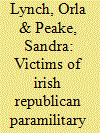

|
|
|
|
|
| Summary/Abstract |
Throughout the history of Northern Ireland's (NI) “Troubles,” over 3,800 individuals were killed, with between 40,000 to 100,000 individuals injured, leaving many families and communities struggling with the aftermath. In recent times a particular category of victims and survivors has been politically active and thus featured prominently in the media: “The Disappeared.” This label has come to represent the victims of paramilitary groups whose remains were secretly disposed of. Through a long public and political battle the families of the Disappeared have achieved a measure of political success resulting in the establishment of the Independent Commission for the Location of Victims' Remains (ICLVR). Achieving political voice is not the only or perhaps the most significant difficulty encountered by these families. Their experiences in fact epitomise the complexity of the conflict and divisions in NI society and reflect the dominant issues of loyalty, identity, and importantly—silence. Throughout The Troubles, this silence and related notions of loyalty permeated all levels of society: at a community level which included the response of the church; at a statutory level including the response from social services and police; and, at a political level including local political processes but also departments within the British and Irish governments. This article examines the experiences of the families of the Disappeared through a multilevel analysis of their public campaign seeking the return of the remains of their family members. Using data collected from the families, members of the ICLVR, and support workers, the experience of the families of the Disappeared are analysed through accessing the social dynamics of silence (and loyalty), in-group affiliations, notions of sacrifice, and the attribution of blame; political successes both national and international will also serve to frame the analysis.
|
|
|
|
|
|
|
|
|
|
|
|
|
|
|
|
|
|
|
|
|